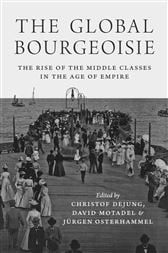The Global Bourgeoisie
The Rise of the Middle Classes in the Age of Empire
Christof Dejung, David Motadel, Jürgen Osterhammel
 While the nineteenth century has been described as the golden age of the European bourgeoisie, the emergence of the middle class and bourgeois culture was by no means exclusive to Europe. The Global Bourgeoisie explores the rise of the middle classes around the world during the age of empire. Bringing together eminent scholars, this landmark essay collection compares middle-class formation in various regions, highlighting differences and similarities, and assesses the extent to which bourgeois growth was tied to the increasing exchange of ideas and goods. The contributors indicate that the middle class was from its very beginning, even in Europe, the result of international connections and entanglements.
While the nineteenth century has been described as the golden age of the European bourgeoisie, the emergence of the middle class and bourgeois culture was by no means exclusive to Europe. The Global Bourgeoisie explores the rise of the middle classes around the world during the age of empire. Bringing together eminent scholars, this landmark essay collection compares middle-class formation in various regions, highlighting differences and similarities, and assesses the extent to which bourgeois growth was tied to the increasing exchange of ideas and goods. The contributors indicate that the middle class was from its very beginning, even in Europe, the result of international connections and entanglements.
The first global history of the middle class
Essays are grouped into six thematic sections: the political history of middle-class formation, the impact of imperial rule on the colonial middle class, the role of capitalism, the influence of religion, the obstacles to the middle class beyond the Western and colonial world, and, lastly, reflections on the creation of bourgeois cultures and global social history. Placing the establishment of middle-class society into historical context, this book shows how the triumph or destabilization of bourgeois values can shape the liberal world order.
The Global Bourgeoisie irrevocably changes the understanding of how an important social class came to be.
- Princeton University Press; November 2019
- ISBN: 9780691189918
- Title: The Global Bourgeoisie
- Author: Christof Dejung; David Motadel; Jürgen Osterhammel
- Imprint: Princeton University Press
In The Press
"The Global Bourgeoisie provides a comparative view of the middle classes and bourgeois cultures that emerged during the nineteenth century. Examining their interconnections, differences, and similarities, this seminal reference gives a profound inside look into diverse parts of the world."—Angelika Epple, Bielefeld University
About The Author
Christof Dejung is professor of modern history at the University of Bern. David Motadel is associate professor of international history at the London School of Economics and Political Science. Jürgen Osterhammel is professor emeritus of modern and contemporary history at the University of Konstanz.
Read online
If you’re using a PC or Mac you can read this ebook online in a web browser, without downloading anything or installing software.
Download file formats
This ebook is available in two file types:
- PDF (encrypted)
- EPUB (encrypted)
After you've bought this ebook, you can choose to download either the PDF version or the ePub, or both.
Digital Rights Management (DRM)
The publisher has supplied this book in encrypted form, which means that you need to install free software in order to unlock and read it.
Required software
To read this ebook on a mobile device (phone or tablet) you'll need to install one of these free apps:
- Ebook Reader (recommended)
- Bluefire Reader
- Aldiko Reader (iOS / Android)
To download and read this eBook on a PC or Mac:
- Adobe Digital Editions (This is a free app specially developed for eBooks. It's not the same as Adobe Reader, which you probably already have on your computer.)
Limits on printing and copying
The publisher has set limits on how much of this ebook you may print or copy. See details.

